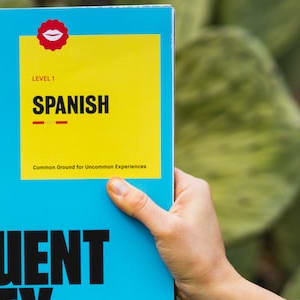say that: Idiom Meaning and Origin
What does ‘say that’ mean?
The idiom "say that" is used to express surprise or disbelief when someone makes a statement that is unexpected or hard to believe.

Idiom Explorer
The idiom "say when" means to indicate when something is enough or satisfactory.
The idiom "say no more" is used to convey that there is no need to provide further explanation or information, as the listener already understands the intended meaning.
The idiom "say it all" means to fully express or reveal everything, leaving nothing unsaid or unexplained.
The idiom "say goodbye" means to part or separate from someone or something, often permanently. It implies a finality or ending to a relationship, situation, or opportunity.
The idiom "say again" is used to ask someone to repeat or clarify what they have just said.
The idiom "raise eyebrows" means to cause surprise, curiosity, or disapproval. It suggests that something is unexpected or unusual, often leading others to question or doubt the situation or action.
The idiom *quote unquote* is used to indicate that the words or phrase being quoted are sarcastic, ironic, or not to be taken literally. It is often used to indicate skepticism or to distance oneself from the quoted expression.
The idiom "quelle surprise" is a sarcastic remark used to express a lack of surprise or to mock something that is expected or predictable.
The idiom "pray tell" is used to politely ask someone to provide information or share a secret or surprising fact.
FAIL
The idiom "say that" is a commonly used phrase in the English language. It can be interpreted as an expression of doubt or disbelief towards a statement or claim made by someone else. The origins and etymology of this idiom are not widely documented, making it difficult to trace its exact history. However, it is clear that the phrase has been used for quite some time, with examples of its usage dating back several decades.
One possible explanation for the origin of this idiom is that it evolved from the practice of expressing skepticism by challenging someone to provide evidence or proof for their statement. By asking the person to "say what," the listener is essentially asking for further clarification or verification. Over time, this phrase has become a shorthand way of expressing doubt or disbelief without explicitly challenging the speaker to provide evidence.
In everyday conversation, the idiom "say that" is often used as a response to someone making a bold or dubious claim. By saying "say what," the listener is expressing their skepticism or disbelief in a concise and somewhat dismissive manner. It can also be used to highlight the absurdity or incredulity of a statement. quelle surprise!
While the idiom "say that" is commonly used in spoken language, it is worth noting that its usage in formal or written contexts may be considered informal or colloquial. In more formal settings, it is generally preferred to use more explicit expressions of doubt or disbelief, such as "I find that hard to believe" or "That seems unlikely." However, in informal conversations or casual writing, the idiom "say that" can be a convenient and efficient way of expressing skepticism. oh my gosh!
It is interesting to note that the idiom "say that" does not have a direct equivalent in many other languages. The concept of expressing doubt or disbelief in such a concise and dismissive manner may be unique to the English language. This idiom highlights the richness and complexity of language, as well as the cultural nuances that can be found within different idiomatic expressions. Oh my!
The idiom "say that" is a commonly used phrase in the English language that expresses doubt or disbelief towards a statement or claim made by someone else. While its exact origins and etymology remain unclear, it is clear that the phrase has been in use for quite some time. Its usage in spoken language is common, although it may be considered informal or colloquial in more formal or written contexts. This idiom showcases the unique ways in which language can convey meaning and express skepticism. oh my goodness!
Example usage
Examples of how the idiom "say that" can be used in a sentence:
- He said that he is not feeling well and needs to rest.
- My friend said that she would meet me at the park later.
- They said that the concert was amazing and they had a great time.
More "Communication" idioms



